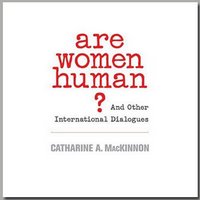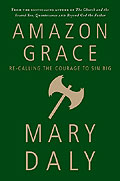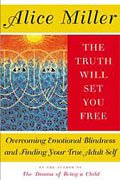 Writing at The Nation, Martha Nussbaum opens her review of feminist and lawyer Catharine A. MacKinnon's book, Are Women Human?, with a reality punch in the gut:
Writing at The Nation, Martha Nussbaum opens her review of feminist and lawyer Catharine A. MacKinnon's book, Are Women Human?, with a reality punch in the gut:
Inequality on the basis of sex is a pervasive reality of women's lives all over the world. So is sex-related violence. Rape by strangers and acquaintances, rape within marriage, domestic violence, trafficking into sex work, the abuse of women and girls in the pornography industry: In all these ways, argues Catharine MacKinnon, women suffer aggression and exploitation, "because we are women, systemically and systematically." Although violence against women is certain to be underreported and undercounted, data still show a tremendous amount of it everywhere. (Cross-cultural studies cited by MacKinnon show that rates of violent domestic abuse are similar in the United States, Japan and India.) As a 1989 United Nations report summarizes, "The risk of violence and violation within the household is one thing women, irrespective of their social position, creed, colour or culture, share in common." So, too, is vulnerability to rape in wartime--the well-documented mass rapes of Bosnian women being just one recent example of an appalling reality that has characterized most armed conflicts.
Despite the prevalence of these crimes, they have not been well addressed under international human rights law--if, indeed, they have been addressed at all. Typically, there has been what MacKinnon calls a "double-edged denial": The abuse is considered either too extraordinary to be believed or too ordinary to constitute a major human rights violation. Or, as MacKinnon says, "If it's happening, it's not so bad, and if it's really bad, it isn't happening." Until recently, abuses like rape and sexual torture lacked good human rights standards because human rights norms were typically devised by men thinking about men's lives. In other words, "If men don't need it, women don't get it." What this lack of recognition has meant is that women have not yet become fully human in the legal and political sense, bearers of equal, enforceable human rights.
Wow! We have a long way to go. The situation has improved through international agreements such as the 1979 Convention of the Elimination of All forms of Discrimination Against Women (CEDAW) that has addressed domestic violence and sexual harassment, and through the efforts of women's organizations, networks, and NGOs that have...
...pressured states and the international community to act on issues like trafficking and rape in war. Indeed, as MacKinnon notes, "Women's resistance to their status and treatment" is now "the cutting edge of change in international human rights."
MacKinnon through her "shrewd" and "creative use" of the Alien Tort Claims Act "brought suit against Bosnian Serb leader Radovan Karadzic on behalf of a specific group of female clients, seeking damages for injuries consisting in 'genocidal sexual atrocities perpetrated as a result of [his] policy of ethnic cleansing.' " The reward: a permanent injunction to stop the genocide and a $475 million judgment delivered in the State of New York.
The main theme of MacKinnon's book...
...repeatedly and convincingly mined, is the hypocrisy of the international system when it faces up to some crimes against humanity but fails to confront similar harms when they happen to women, often on a daily basis. There is a category of torture, and we think we know how to define it. We think we know what it does: It uses violence to control and intimidate. And yet when violence is used to control and intimidate women "in homes in Nebraska...rather than prison cells in Chile," we don't call it torture, and we somehow think it is not the same thing. Torture in Chile is not explained away as the work of isolated sick individuals. We know it is political, and we can see how systemic it often is. When violence happens to women in Nebraska, we say, Oh well, that was only some sicko, and men really aren't like that. Well, given the numbers, shouldn't we ask more questions about that?
Again, we have a concept of war, and we think we know what war is: People get maimed and killed fighting over land and power. And yet when women get raped and beaten up by men who want to control them, we pay little heed. "It is hard to avoid the impression that what is called war is what men make against each other, and what they do to women is called everyday life."
As in her prior work, MacKinnon is caustic about the damage done by the traditional liberal distinction between a "public sphere" and a "private sphere," a distinction that insulates marital rape and domestic violence from public view and makes people think it isn't political. "Why isn't this political?... The fact that you may know your assailant does not mean that your membership in a group chosen for violation is irrelevant to your abuse. It is still systematic and group-based. It...is defined by the distribution of power in society."
Steinem long ago coined the slogan, "the personal is political " and her words seem to refrain in the subjects MacKinnon undertakes of the "private sphere." Indeed, why isn't this political?
In the two most deeply troubling articles in the collection, "Genocide's Sexuality" and "Women's September 11th," MacKinnon examines the internationally accepted definitions of genocide and terrorism, and argues that many acts of men against women meet one or both of these definitions. As defined under the UN convention on genocide, genocide is either killing or inflicting serious bodily or mental harm on members of a group, with intent to destroy that group either entirely or in part. The groups mentioned are "national, ethnical, racial, or religious" groups: So in that sense violence against women clearly doesn't qualify. On other grounds, however, one could argue that a great part of violence against women does involve a similar infliction of "serious harm" on women because they are women, and its aim can be said to be to destroy "in part"--for "destroy," if mental harm is sufficient for genocide, must mean not "kill" but "remove from the ranks of the fully human"--something that happens to women all the time.
We hear of post traumatic stress disorder and its usual association with soldiers of war but the most common PTSDs are those not of men in war, but of women in civilian life. Judith Herman, M.D., in her book, Trauma and Recovery, described the "domestic captivity" of women and children, "those subjected to totalitarian systems in sexual and domestic life, including survivors of domestic battering, childhood physical or sexual abuse, and organized sexual exploitation." A quick glance of domestic violence statistics so pervasive in American society--worldwide, one in three women "has been beaten, coerced into sex or otherwise abused during her lifetime"--will confirm that the casualties of the private sphere rival those in the public sphere. I repeat MacKinnon's question, so why isn't this political?
An insightful and enlightening book and one I encourage readers to buy, you can read the complete review on MacKinnon's Are Women Human? at The Nation.























|